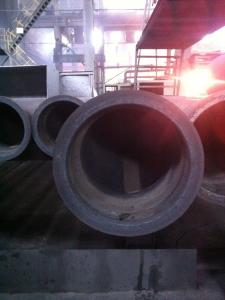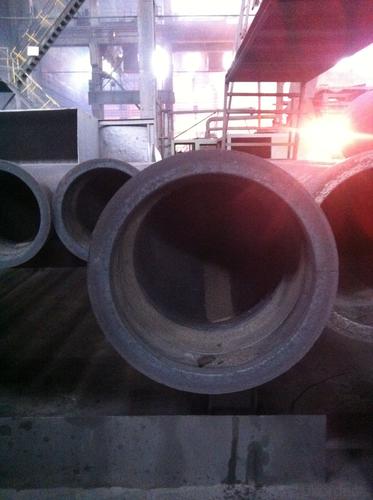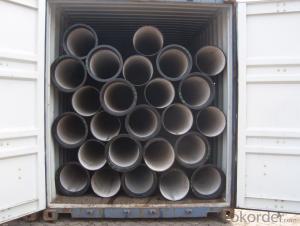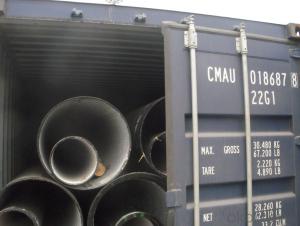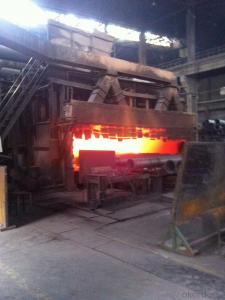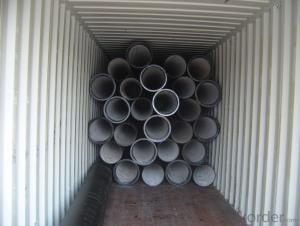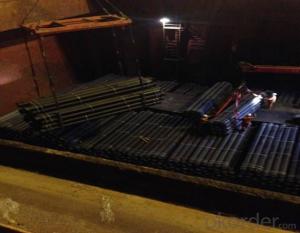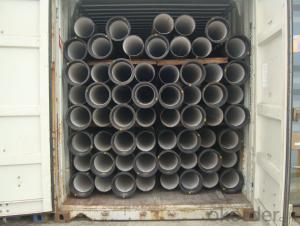DUCTILE IRON PIPE AND PIPE FITTINGS K8 CLASS DN1200
- Loading Port:
- Tianjin
- Payment Terms:
- TT OR LC
- Min Order Qty:
- 23 pc
- Supply Capability:
- 3000 pc/month
OKorder Service Pledge
OKorder Financial Service
You Might Also Like
· Material : Ductile Cast Iron
· Size Range : DN 80mm to DN 2000mm
· Unit Effective Length : 6m or 5.7m
· Manufacture Standard: ISO 2531:1998/ EN 545:2006/EN 598:2007
· Annual capacity : 200,000 tons
· Coating Exterior: Zinc 130g/m2 according to ISO 8179-1 and bitumen coating 70 microns.
· Cement Interior: Portland Cement/ High Alumina Cement/ Sulphate Resisting Cement Lining according to ISO 4179
· Special requirements on external coating and internal lining can be applied
· We also provide accessories such as SBR/EPDM rubber gaskets, lubricant paste, pipe caps, PE sleeves, etc.
Additional Parts:
Each pipe is strictly inspected according to related standard to ensure permanently high performance.
Easy Installation at site and service free for life
Long Service Lifespan
Quotation will arrive you within 24hours once we get your inquiry.
We guarantee offering you a competitive price.
A copy of original inspection reports of pipes will be offered after shipment.
Photos of loading process will be sent to the customer after shipment effect.
We will follow-up the delivery progress after shipment effect and update to the customer on weekly basis.
- Q: What are the different lining thickness options for ductile iron pipe?
- The specific application and project requirements typically dictate the various options for lining thickness in ductile iron pipes. Cement mortar lining, polyurethane lining, and polyethylene lining are among the most commonly used options. Cement mortar lining, which is widely employed in ductile iron pipes, involves the application of a layer of cement mortar on the inner surface of the pipe. This lining provides corrosion protection and enhances the hydraulic performance of the pipe. The thickness of cement mortar lining can vary from 3mm to 6mm. Polyurethane lining, another popular choice, is particularly suitable for applications requiring resistance to abrasion and chemical attack. It is usually applied using a spray or casting method, and the thickness can vary depending on project specifications. Typically, polyurethane linings range from 1mm to 4mm in thickness. Polyethylene lining, a relatively newer technology, is commonly used in applications where chemical corrosion resistance is crucial. The lining is applied using a rotational lining process, wherein a layer of molten polyethylene is evenly distributed on the internal surface of the pipe. The thickness of polyethylene lining can range from 2mm to 8mm, depending on project requirements. It is worth noting that the lining thickness can be tailored to meet specific project needs, including the corrosiveness of the transported fluid, operating conditions, and desired service life of the pipe. Consulting with a qualified engineer or pipe manufacturer is advisable to determine the most suitable lining thickness for a given application.
- Q: Can ductile iron pipes be used for underground storage tanks?
- Ductile iron pipes can indeed be used for underground storage tanks in certain situations. Ductile iron is a strong and durable material that is resistant to corrosion, making it suitable for underground applications. However, there are a few factors to consider before using ductile iron pipes for underground storage tanks. Firstly, it is important to assess the specific requirements and regulations of the project. Different regions and industries may have specific guidelines for the materials used in underground storage tanks. It is crucial to ensure that ductile iron pipes comply with these regulations and meet the necessary standards for underground storage. Secondly, the size and capacity of the storage tank should be considered. Ductile iron pipes are available in a variety of sizes, but they may not be suitable for large-scale storage tanks due to limitations in their dimensions. It is important to consult with engineers or experts to determine the appropriate pipe size and capacity for the specific storage requirements. Lastly, the design and installation of the underground storage tank should be carefully planned. Proper sealing and protection against external factors such as soil movements, water pressure, or other potential hazards should be considered. Adequate measures should be taken to prevent leaks or damage to the pipes, ensuring the safety and longevity of the storage tank. In conclusion, ductile iron pipes can be used for underground storage tanks, but it is essential to consider the specific requirements, regulations, sizing limitations, and proper design and installation. Consulting with professionals in the field and adhering to industry standards will ensure the successful use of ductile iron pipes for underground storage tanks.
- Q: What are the different methods for restraining ductile iron pipe?
- There exist various techniques for restraining ductile iron pipe to prevent any movement or displacement caused by internal pressure, external forces, or ground movement. The most commonly used approaches include: 1. Thrust blocks: Concrete blocks or structures are positioned at bends, tees, or other directional changes in the pipe. These blocks are designed to resist the forces exerted by flowing water or fluids within the pipe, effectively anchoring it in place. 2. Mechanical restraints: Harnesses or clamps are installed around the pipe and affixed to a fixed structure, such as a wall or concrete anchor. These restraints provide a physical barrier that prevents any movement or shifting of the pipe. 3. Pipe restraints: Devices directly attached to the pipe and anchored to a fixed structure, such as pipe clamps, restraints, or saddles. They are designed to securely hold the pipe in place and resist any movement or displacement. 4. Proper pipe bedding and backfill: It is crucial to properly support and surround the pipe with compacted material to prevent any movement or shifting. This method involves carefully placing and compacting soil or suitable materials around the pipe to provide stability and prevent displacement. 5. Trench walls: The walls of the trench where the ductile iron pipe is installed can also contribute to restraining it. By correctly compacting the soil against the pipe and ensuring proper stability of the trench walls, the pipe can be effectively restrained and prevented from moving. Overall, the various methods for restraining ductile iron pipe aim to ensure its secure placement without any displacement or movement. The choice of method depends on factors such as location, application, and the forces acting on the pipe. It is important to consult with engineers and adhere to industry guidelines and standards to determine the most appropriate method for restraining ductile iron pipe in specific situations.
- Q: Are ductile iron pipes suitable for gravity flow applications?
- Yes, ductile iron pipes are suitable for gravity flow applications. Ductile iron is a strong and durable material that can withstand the weight of the water and solid waste flowing through the pipes without any issues. It has high tensile strength and can resist damage from external forces such as soil movement or heavy traffic loads. Additionally, ductile iron pipes have smooth inner surfaces that promote efficient flow and minimize friction losses. They are also resistant to corrosion and can last for decades without requiring frequent maintenance or replacement. Overall, ductile iron pipes are a reliable choice for gravity flow applications due to their strength, durability, and resistance to various environmental factors.
- Q: Can ductile iron pipe be used in high-pressure applications?
- Indeed, high-pressure applications can utilize ductile iron pipe. Ductile iron pipe possesses impressive strength and durability, rendering it appropriate for diverse applications, particularly high-pressure systems. Its tensile strength and yield strength surpass those of alternative cast iron pipes, enabling it to endure elevated pressures. Moreover, ductile iron pipe resists corrosion and upholds its structural integrity even amidst high-pressure conditions. Nonetheless, it is crucial to guarantee the accurate installation of the pipe and adherence to all essential safety measures to ensure the secure and efficient operation of the high-pressure system.
- Q: How is ductile iron pipe protected against external corrosion?
- Ductile iron pipe is protected against external corrosion through a variety of methods that ensure its durability and longevity. One common method is the application of protective coatings. The pipe is typically coated with a layer of zinc or asphaltic material, which acts as a barrier between the iron pipe and the surrounding environment. This coating helps to prevent direct contact between the pipe and corrosive elements such as soil, moisture, and chemicals, thereby reducing the risk of corrosion. Additionally, ductile iron pipes are often wrapped with a layer of polyethylene or polypropylene tape. This tape provides an extra layer of protection against external corrosion by serving as a physical barrier that shields the pipe from moisture and other potentially corrosive substances. The tape is applied with care to ensure complete coverage and adherence to the pipe's surface. Furthermore, cathodic protection is commonly employed to safeguard ductile iron pipes against external corrosion. This technique involves the installation of sacrificial anodes or impressed current systems near the pipe. These anodes generate a protective electrical current that counteracts the corrosion process, effectively inhibiting the deterioration of the pipe's surface. Lastly, proper installation practices play a crucial role in preventing external corrosion. It is essential to ensure that the pipe is buried at an appropriate depth, allowing for adequate soil coverage. This helps to minimize exposure to corrosive elements and maintain the integrity of the protective coatings. Additionally, proper backfilling techniques and the use of corrosion-resistant bedding materials can further enhance the pipe's resistance to external corrosion. In conclusion, ductile iron pipe is protected against external corrosion through a combination of protective coatings, tape wrapping, cathodic protection systems, and proper installation practices. These measures work together to provide a robust defense against the corrosive forces that the pipe may encounter, ensuring its longevity and reliability in various applications.
- Q: What are the interface forms of ductile iron pipes? The best drawings are available. Thank you
- Because of this interface and the corresponding T sealing aprons can withstand greater deflection angle and greater tolerances, especially suitable for unstable formations and corners.
- Q: Can ductile iron pipe be recycled?
- Yes, ductile iron pipe can be recycled. It is a highly recyclable material that can be melted down and reused in the production of new ductile iron products. Recycling ductile iron pipe helps reduce waste and conserves natural resources.
- Q: Are ductile iron pipes suitable for installation in areas with high soil settlement and consolidation?
- Yes, ductile iron pipes are suitable for installation in areas with high soil settlement and consolidation. Ductile iron pipes have high strength and flexibility, allowing them to withstand ground movements without cracking or breaking. They are also resistant to corrosion, which further enhances their suitability for such environments.
- Q: How do ductile iron pipes handle seismic movements?
- Ductile iron pipes are renowned for their exceptional capacity to handle seismic movements, owing to their distinctive properties and construction. This renders them remarkably resistant to stress and deformation caused by ground vibrations during earthquakes. One of the primary merits of ductile iron pipes lies in their superior tensile strength, enabling them to endure substantial forces without succumbing to breakage or rupture. When seismic movements occur, these pipes exhibit flexibility and absorb the energy generated by the ground vibrations, thereby minimizing the risk of damage or failure. Moreover, ductile iron pipes possess exemplary resilience, allowing them to revert to their original shape after being subjected to external forces. This characteristic empowers the pipes to adapt to ground movements during earthquakes, effectively diminishing the likelihood of fractures or leaks. Furthermore, ductile iron pipes boast considerable ductility, enabling them to deform without fracturing. This attribute proves crucial during seismic events, as it enables the pipes to absorb the energy generated by ground vibrations by deforming and subsequently returning to their original shape once the seismic activity subsides. In order to further enhance their capacity to handle seismic movements, ductile iron pipes are frequently designed and installed with flexible joints. These joints grant the pipes the ability to move and adjust to ground movements, offering additional safeguards against damage or failure. In conclusion, ductile iron pipes have demonstrated their extraordinary reliability and resilience in withstanding seismic movements. Their combination of high tensile strength, resilience, and ductility make them an optimal choice for regions prone to earthquakes, ensuring the safety and durability of fluid transportation systems.
Send your message to us
DUCTILE IRON PIPE AND PIPE FITTINGS K8 CLASS DN1200
- Loading Port:
- Tianjin
- Payment Terms:
- TT OR LC
- Min Order Qty:
- 23 pc
- Supply Capability:
- 3000 pc/month
OKorder Service Pledge
OKorder Financial Service
Similar products
Hot products
Hot Searches
Related keywords
